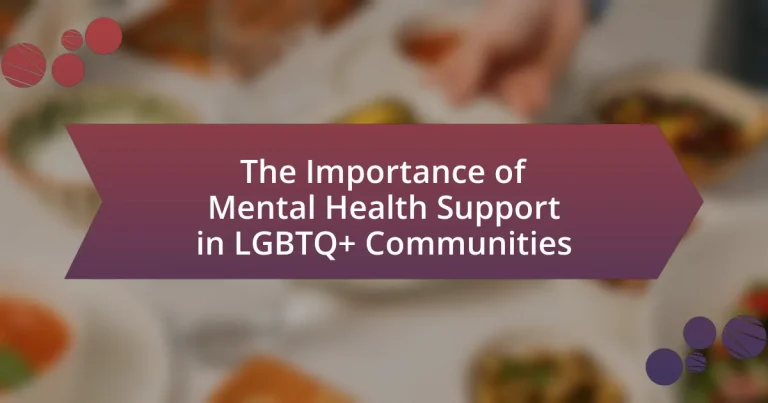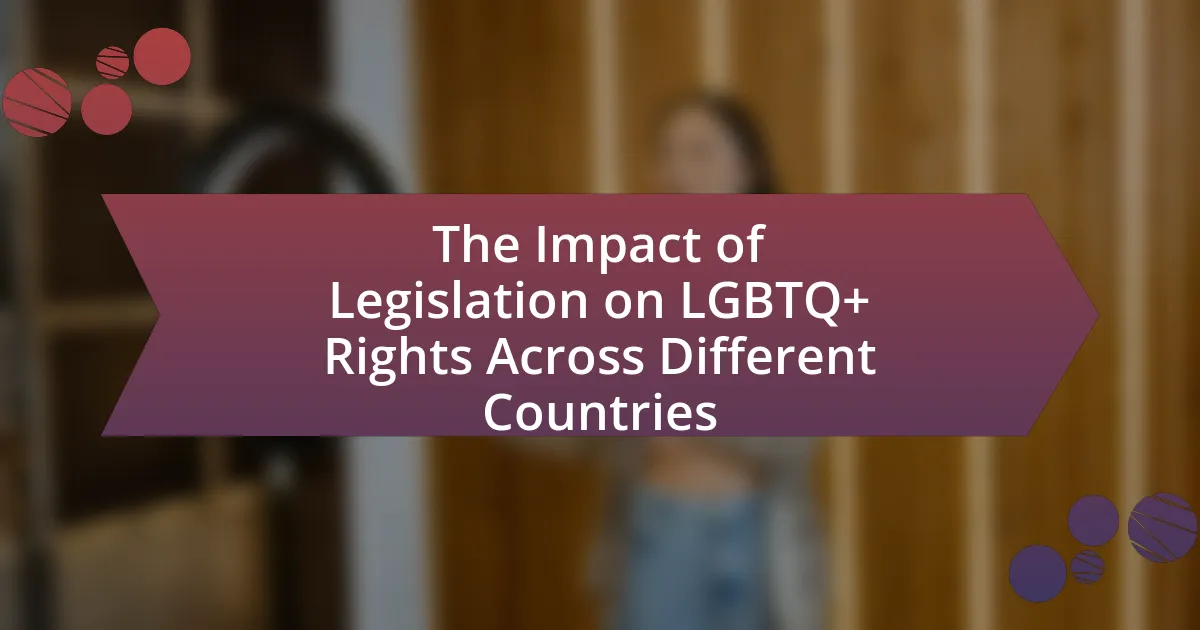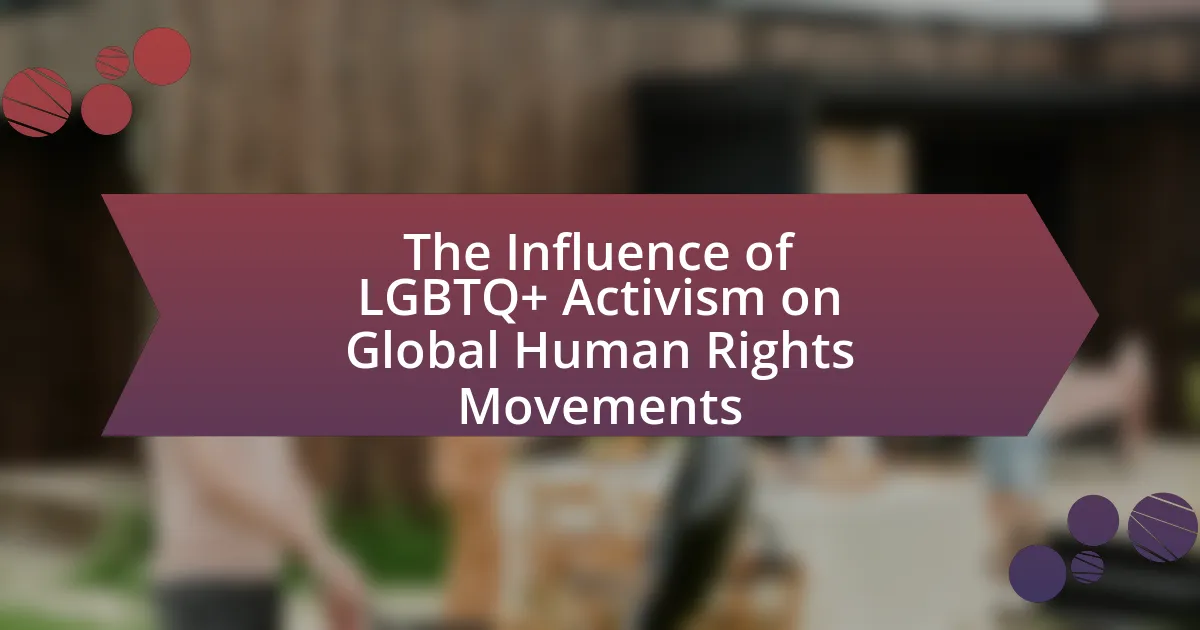The article emphasizes the critical importance of mental health support within LGBTQ+ communities, highlighting the heightened risk of mental health issues such as depression, anxiety, and suicidal ideation due to discrimination, stigma, and social isolation. It discusses the unique challenges faced by LGBTQ+ individuals, including societal stigma and the impact of isolation on mental well-being. The article also explores the role of community support, peer support groups, and culturally competent mental health services in improving mental health outcomes. Furthermore, it outlines the consequences of inadequate mental health support and offers practical steps for enhancing resources and awareness within these communities.

What is the Importance of Mental Health Support in LGBTQ+ Communities?
Mental health support is crucial in LGBTQ+ communities due to the heightened risk of mental health issues stemming from discrimination, stigma, and social isolation. Research indicates that LGBTQ+ individuals experience higher rates of depression, anxiety, and suicidal ideation compared to their heterosexual counterparts. For instance, a study published in the American Journal of Public Health found that LGBTQ+ youth are more than twice as likely to experience mental health challenges. Access to mental health support can mitigate these risks by providing safe spaces for expression, fostering resilience, and promoting overall well-being.
Why is mental health support crucial for LGBTQ+ individuals?
Mental health support is crucial for LGBTQ+ individuals because they face higher rates of mental health issues due to discrimination, stigma, and social isolation. Research indicates that LGBTQ+ individuals are more likely to experience anxiety, depression, and suicidal ideation compared to their heterosexual counterparts. For instance, a study published in the American Journal of Public Health found that LGBTQ+ youth are 120% more likely to experience homelessness, which significantly impacts their mental well-being. Access to mental health support can provide these individuals with coping strategies, a sense of community, and validation, ultimately improving their overall mental health outcomes.
What unique challenges do LGBTQ+ individuals face regarding mental health?
LGBTQ+ individuals face unique challenges regarding mental health, primarily due to stigma, discrimination, and social isolation. These factors contribute to higher rates of anxiety, depression, and suicidal ideation within this community. Research from the National Alliance on Mental Illness indicates that LGBTQ+ individuals are more than twice as likely to experience mental health issues compared to their heterosexual counterparts. Additionally, the minority stress theory posits that the chronic stress faced by LGBTQ+ individuals due to societal prejudice leads to adverse mental health outcomes. This evidence underscores the critical need for targeted mental health support within LGBTQ+ communities.
How does societal stigma impact mental health in LGBTQ+ communities?
Societal stigma significantly impacts mental health in LGBTQ+ communities by contributing to higher rates of anxiety, depression, and suicidal ideation. Research indicates that individuals who experience stigma related to their sexual orientation or gender identity are more likely to face mental health challenges; for instance, a study published in the American Journal of Public Health found that LGBTQ+ individuals are 2.5 times more likely to experience mental health disorders compared to their heterosexual counterparts. This stigma often leads to social isolation, discrimination, and internalized homophobia, further exacerbating mental health issues. The cumulative effect of these factors underscores the urgent need for targeted mental health support within LGBTQ+ communities to mitigate the adverse effects of societal stigma.
What role does community support play in mental health?
Community support plays a crucial role in mental health by providing individuals with a sense of belonging, reducing feelings of isolation, and fostering resilience. Research indicates that strong community ties can lead to improved mental health outcomes, as individuals who feel supported are less likely to experience anxiety and depression. For instance, a study published in the American Journal of Public Health found that social support significantly correlates with lower levels of psychological distress among LGBTQ+ individuals, highlighting the importance of community networks in promoting mental well-being.
How can peer support groups benefit LGBTQ+ individuals?
Peer support groups can significantly benefit LGBTQ+ individuals by providing a safe space for sharing experiences and fostering a sense of belonging. These groups facilitate emotional support, reduce feelings of isolation, and enhance mental well-being through shared understanding and acceptance. Research indicates that participation in peer support groups can lead to improved mental health outcomes, such as reduced anxiety and depression, as evidenced by a study published in the Journal of Homosexuality, which found that LGBTQ+ individuals who engaged in peer support reported higher levels of resilience and lower levels of psychological distress.
What are the effects of isolation on mental health in LGBTQ+ populations?
Isolation negatively impacts the mental health of LGBTQ+ populations by increasing the risk of depression, anxiety, and suicidal ideation. Studies indicate that LGBTQ+ individuals often experience higher levels of social isolation due to stigma, discrimination, and lack of acceptance, which can exacerbate feelings of loneliness and hopelessness. For instance, a report by the Trevor Project found that 39% of LGBTQ+ youth seriously considered suicide in 2020, with isolation being a significant contributing factor. Furthermore, research published in the Journal of Homosexuality highlights that social support networks are crucial for mitigating these mental health risks, emphasizing the need for community and connection among LGBTQ+ individuals.
What are the consequences of inadequate mental health support?
Inadequate mental health support leads to increased rates of mental health disorders, substance abuse, and suicide among individuals, particularly in vulnerable populations such as LGBTQ+ communities. Research indicates that LGBTQ+ individuals experience higher levels of anxiety, depression, and suicidal ideation due to societal stigma and discrimination, which are exacerbated by a lack of accessible mental health resources. For instance, a study published in the American Journal of Public Health found that LGBTQ+ youth are more than twice as likely to attempt suicide compared to their heterosexual peers, highlighting the critical need for effective mental health support systems.
How does lack of support contribute to mental health disorders in LGBTQ+ individuals?
Lack of support significantly contributes to mental health disorders in LGBTQ+ individuals by increasing feelings of isolation and distress. Research indicates that LGBTQ+ individuals who experience rejection from family, friends, or community face higher rates of depression, anxiety, and suicidal ideation. For instance, a study published in the American Journal of Public Health found that LGBTQ+ youth who lack supportive environments are 120% more likely to attempt suicide compared to their peers with supportive networks. This lack of support exacerbates the challenges faced by LGBTQ+ individuals, leading to a higher prevalence of mental health issues.
What are the long-term effects of untreated mental health issues in these communities?
Untreated mental health issues in LGBTQ+ communities can lead to severe long-term effects, including increased rates of suicide, substance abuse, and chronic health conditions. Research indicates that LGBTQ+ individuals experience higher levels of depression and anxiety, which, if left unaddressed, can result in a 2.5 times greater likelihood of suicidal ideation compared to their heterosexual counterparts. Additionally, untreated mental health problems can contribute to social isolation, decreased quality of life, and barriers to accessing healthcare, further exacerbating existing disparities. These long-term consequences highlight the critical need for mental health support tailored to the unique challenges faced by LGBTQ+ individuals.

How can mental health support be effectively provided to LGBTQ+ communities?
Mental health support can be effectively provided to LGBTQ+ communities through culturally competent care, which involves understanding the unique challenges faced by these individuals. This approach includes training mental health professionals in LGBTQ+ issues, ensuring that services are inclusive and affirming, and creating safe spaces for open dialogue. Research indicates that LGBTQ+ individuals experience higher rates of mental health issues, such as depression and anxiety, often due to stigma and discrimination (Meyer, 2003, “Prejudice, Social Stress, and Mental Health in Gay Men”). By implementing targeted outreach programs and peer support networks, mental health services can better address the specific needs of LGBTQ+ populations, leading to improved mental health outcomes.
What types of mental health services are most beneficial?
Therapeutic services such as cognitive-behavioral therapy (CBT), group therapy, and crisis intervention are among the most beneficial mental health services. CBT has been shown to effectively reduce symptoms of anxiety and depression, with studies indicating that approximately 60-70% of individuals experience significant improvement after treatment. Group therapy provides a supportive environment where individuals can share experiences and foster community, which is particularly vital in LGBTQ+ populations that may face isolation. Crisis intervention services offer immediate support during acute mental health crises, helping to stabilize individuals and connect them to ongoing care. These services collectively address the unique challenges faced by LGBTQ+ individuals, promoting resilience and well-being.
How do therapy and counseling specifically address LGBTQ+ issues?
Therapy and counseling specifically address LGBTQ+ issues by providing a safe and affirming space for individuals to explore their identities, experiences, and challenges. These therapeutic practices often incorporate an understanding of the unique stressors faced by LGBTQ+ individuals, such as discrimination, stigma, and internalized homophobia. Research indicates that LGBTQ+ individuals experience higher rates of mental health issues, including depression and anxiety, compared to their heterosexual counterparts, highlighting the need for specialized support. For instance, a study published in the American Journal of Public Health found that LGBTQ+ youth are at a significantly higher risk for suicidal ideation and attempts, underscoring the critical role of mental health services tailored to their needs. By utilizing culturally competent approaches, therapists can help clients navigate issues related to coming out, relationship dynamics, and societal acceptance, ultimately fostering resilience and well-being within LGBTQ+ communities.
What role do hotlines and online resources play in providing support?
Hotlines and online resources serve a critical role in providing support by offering immediate access to mental health assistance for individuals in the LGBTQ+ community. These platforms facilitate confidential communication, allowing users to seek help without fear of stigma or discrimination. Research indicates that LGBTQ+ individuals often face unique mental health challenges, including higher rates of anxiety and depression, making accessible support essential. For instance, the Trevor Project reports that 40% of LGBTQ+ youth seriously considered suicide in the past year, highlighting the urgent need for supportive resources. By providing 24/7 availability and trained counselors, hotlines and online resources effectively address these mental health crises, ensuring that individuals receive timely and relevant support.
How can allies and organizations contribute to mental health support?
Allies and organizations can contribute to mental health support by providing resources, advocacy, and safe spaces for LGBTQ+ individuals. Organizations can implement programs that offer counseling services, peer support groups, and educational workshops focused on mental health awareness. For instance, the Trevor Project provides crisis intervention and suicide prevention services specifically for LGBTQ+ youth, demonstrating the impact of targeted support. Allies can amplify these efforts by promoting inclusivity, challenging stigma, and fostering environments where individuals feel safe to express their identities. Research indicates that supportive environments significantly reduce mental health issues among LGBTQ+ individuals, highlighting the importance of allyship and organizational involvement in mental health initiatives.
What initiatives can organizations implement to support LGBTQ+ mental health?
Organizations can implement initiatives such as creating inclusive mental health programs, providing training for staff on LGBTQ+ issues, and establishing support groups specifically for LGBTQ+ individuals. Inclusive mental health programs ensure that services are tailored to the unique experiences and challenges faced by LGBTQ+ individuals, which can lead to improved mental health outcomes. Training for staff enhances their understanding and sensitivity towards LGBTQ+ issues, fostering a supportive environment. Support groups offer a safe space for individuals to share experiences and receive peer support, which has been shown to reduce feelings of isolation and improve mental well-being. Research indicates that LGBTQ+ individuals experience higher rates of mental health issues, making these initiatives crucial for effective support.
How can allies effectively advocate for mental health resources in their communities?
Allies can effectively advocate for mental health resources in their communities by raising awareness, engaging in policy advocacy, and fostering inclusive environments. Raising awareness involves educating the community about mental health issues, particularly those affecting LGBTQ+ individuals, which can be supported by statistics showing that LGBTQ+ youth are more than twice as likely to experience mental health issues compared to their heterosexual peers. Engaging in policy advocacy includes lobbying local governments for funding and support for mental health services tailored to LGBTQ+ needs, as evidenced by studies indicating that increased funding leads to improved mental health outcomes. Fostering inclusive environments means creating safe spaces where LGBTQ+ individuals feel comfortable seeking help, which is crucial given that 40% of LGBTQ+ individuals report feeling unsafe in traditional mental health settings.

What are the best practices for promoting mental health in LGBTQ+ communities?
The best practices for promoting mental health in LGBTQ+ communities include creating safe spaces, providing access to culturally competent mental health services, and fostering community support networks. Safe spaces allow individuals to express their identities without fear of discrimination, which is crucial for mental well-being. Access to culturally competent mental health services ensures that professionals understand the unique challenges faced by LGBTQ+ individuals, as studies show that tailored interventions significantly improve mental health outcomes. Additionally, fostering community support networks, such as peer support groups, has been shown to reduce feelings of isolation and increase resilience among LGBTQ+ individuals, as evidenced by research from the American Psychological Association indicating that social support is a key factor in mental health.
How can individuals support their own mental health?
Individuals can support their own mental health by engaging in regular self-care practices, such as maintaining a balanced diet, exercising, and ensuring adequate sleep. Research indicates that physical health significantly impacts mental well-being; for instance, a study published in the Journal of Clinical Psychiatry found that regular physical activity can reduce symptoms of anxiety and depression. Additionally, individuals can benefit from mindfulness techniques, such as meditation and deep-breathing exercises, which have been shown to lower stress levels and improve emotional regulation. Furthermore, seeking social support from friends, family, or community groups can enhance feelings of belonging and reduce isolation, which is particularly important in LGBTQ+ communities where individuals may face unique challenges.
What self-care strategies are effective for LGBTQ+ individuals?
Effective self-care strategies for LGBTQ+ individuals include engaging in supportive community networks, practicing mindfulness and meditation, and seeking professional mental health support. Research indicates that social support significantly enhances mental well-being; a study published in the Journal of Homosexuality found that LGBTQ+ individuals with strong social networks reported lower levels of depression and anxiety. Additionally, mindfulness practices have been shown to reduce stress and improve emotional regulation, which is crucial for navigating the unique challenges faced by LGBTQ+ individuals. Accessing mental health services tailored to LGBTQ+ needs further promotes resilience and coping skills, as highlighted by the American Psychological Association, which emphasizes the importance of culturally competent care.
How can mindfulness and coping techniques improve mental well-being?
Mindfulness and coping techniques can significantly improve mental well-being by enhancing emotional regulation and reducing stress. Mindfulness practices, such as meditation and deep breathing, help individuals focus on the present moment, which can decrease anxiety and depressive symptoms. Research published in the journal “Psychological Science” indicates that mindfulness can lead to improved emotional resilience and greater life satisfaction. Coping techniques, including problem-solving and positive reframing, empower individuals to manage stressors effectively, fostering a sense of control and promoting mental health. A study in “The Journal of Counseling Psychology” found that individuals who employed adaptive coping strategies reported lower levels of psychological distress. Together, these practices contribute to a healthier mental state, particularly in marginalized communities like LGBTQ+ populations, where mental health challenges are prevalent.
What resources are available for mental health support in LGBTQ+ communities?
Mental health support resources available for LGBTQ+ communities include organizations such as The Trevor Project, which provides crisis intervention and suicide prevention services specifically for LGBTQ+ youth. Additionally, the National Alliance on Mental Illness (NAMI) offers resources tailored to LGBTQ+ individuals, including support groups and educational materials. The Human Rights Campaign also provides mental health resources and advocacy for LGBTQ+ individuals facing discrimination and mental health challenges. These organizations are backed by research indicating that LGBTQ+ individuals experience higher rates of mental health issues due to societal stigma and discrimination, highlighting the necessity of targeted support.
Which organizations provide specialized mental health services for LGBTQ+ individuals?
Organizations that provide specialized mental health services for LGBTQ+ individuals include the Trevor Project, which offers crisis intervention and suicide prevention services specifically for LGBTQ+ youth, and the National Queer and Trans Therapists of Color Network, which focuses on providing mental health support from a culturally competent perspective. Additionally, the Gay and Lesbian Medical Association promotes LGBTQ+ health and wellness, including mental health resources. These organizations are recognized for their commitment to addressing the unique mental health challenges faced by LGBTQ+ individuals, supported by research indicating higher rates of mental health issues within this community compared to the general population.
How can individuals find local support groups and resources?
Individuals can find local support groups and resources by utilizing online directories, community centers, and social media platforms. Online directories such as the LGBTQ+ National Help Center provide listings of local support groups and resources tailored to the LGBTQ+ community. Community centers often host support groups and can be a valuable resource for individuals seeking assistance. Additionally, social media platforms like Facebook and Meetup allow users to connect with local LGBTQ+ groups and events, facilitating access to support networks. These methods are effective as they leverage existing community structures and digital connectivity to enhance mental health support accessibility.
What practical steps can be taken to enhance mental health support?
To enhance mental health support, organizations should implement targeted outreach programs that specifically address the unique needs of LGBTQ+ communities. These programs can include training for mental health professionals on LGBTQ+ issues, creating safe spaces for individuals to share their experiences, and providing resources that are culturally competent and affirming. Research indicates that LGBTQ+ individuals face higher rates of mental health issues, with a study published in the American Journal of Public Health showing that 39% of LGBTQ+ youth seriously considered suicide in the past year. By focusing on these practical steps, mental health support can be significantly improved for LGBTQ+ individuals, fostering a more inclusive and supportive environment.
How can community awareness campaigns improve mental health outcomes?
Community awareness campaigns can improve mental health outcomes by increasing understanding and reducing stigma associated with mental health issues. These campaigns educate the public about mental health conditions, promote resources for support, and encourage open discussions, which can lead to early intervention and treatment. For instance, a study published in the Journal of Community Psychology found that communities with active mental health awareness initiatives saw a 20% increase in individuals seeking help for mental health issues. By fostering an environment of acceptance and support, these campaigns can significantly enhance the overall mental well-being of individuals, particularly in marginalized groups such as LGBTQ+ communities.
What role does education play in reducing stigma around mental health in LGBTQ+ communities?
Education plays a crucial role in reducing stigma around mental health in LGBTQ+ communities by fostering understanding and empathy. By providing accurate information about mental health issues and the unique challenges faced by LGBTQ+ individuals, educational initiatives can challenge misconceptions and stereotypes. Research indicates that comprehensive education programs, such as those implemented in schools and community organizations, have been effective in increasing awareness and acceptance, leading to a decrease in discriminatory attitudes. For instance, a study published in the Journal of Homosexuality found that participants who received training on LGBTQ+ mental health issues reported lower levels of stigma and greater willingness to support individuals in these communities. Thus, education serves as a powerful tool in promoting mental health awareness and reducing stigma within LGBTQ+ populations.





